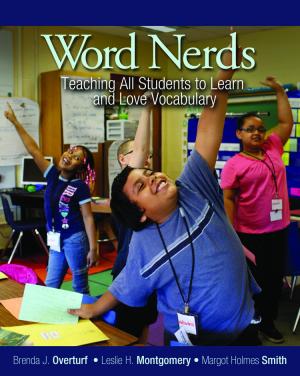
Word Nerds: Teaching All Students to Learn and Love Vocabulary
As a self-proclaimed word nerd, I was immediately drawn to the title of the book. Written by a team of teachers, Word Nerds points to years of research that links vocabulary knowledge and reading comprehension with how a focus on word knowledge is especially important for narrowing the achievement gap for students from low-income communities.
Word Nerds starts with an overview of the extensive research on vocabulary instruction, and by drawing on it proposes key components for strengthening instruction. Strategies such as repeated exposure to words, patterns of word learning (word schemas), reading a wide variety of different texts, rich conversations with adults and peers, playing with words, and direct instruction are all highlighted. Although the overview is helpful, it is the in-depth discussions of how to apply this theory that makes this book such a valuable resource.
Where Word Nerds excels is in its vivid description of literacy programs that have at their core vocabulary instruction. The authors describe a step-by-step routine that they call their “vocabulary cycle.” They introduce words in a variety of ways but always include a vocabulary journal as a critical component. They then add synonyms and antonyms and practise the words using a lot of creative activities, before celebrating the learning and assessing understanding. The activities also foster dialogue about words because the authors found that students need more than dictionaries, thesauruses, and word walls to know words deeply.
What I found most inspiring about Words Nerds was the infectious enthusiasm for the beauty of language and the ideas for how to build this kind of exuberance in the classroom. The authors describe a genuine desire on the part of their students to search out what they call “juicy words.” From scrambles to drama, and word charades to raps, the book outlines games and activities for the whole class, small groups, and independent work.
I highly recommend Word Nerds as an excellent resource for elementary educators. It is both inspiring and methodical in giving tools and resources to teachers who want to make vocabulary instruction a more central part of their literacy program.
Kim Fry is a member of the Toronto Occasional Teacher Local.